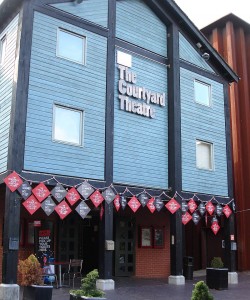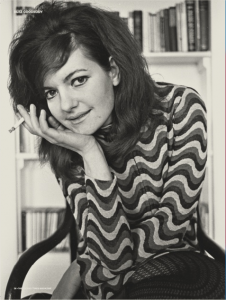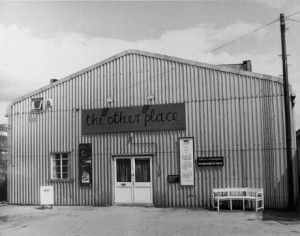This week the Royal Shakespeare Company has been celebrating the opening of what is being called The Other Place at the Courtyard Theatre, a temporary re-imagining of the studio theatre which was once called “the most productive tin hut in history”. Midsummer Mischief is a month-long festival until 12 July of four new plays in two programmes. On Tuesday evening, before the shows, guests who had connections with the little theatre were invited to “Raise a Glass for Buzz” to celebrate the achievement of Buzz Goodbody, the inspirational first artistic director of The Other Place.
Launched in 1974, the theatre was based on using existing resources: actors already in the main theatre season, costumes from the stores, a suitable building. To quote Sally Beauman in her book The Royal Shakespeare Company, “there was a vigour, freedom, and vitality about The Other Place work that first season notably lacking in the new large-theatre productions”. This was largely put down to Buzz Goodbody’s leadership, and it was not surprising that a further season was planned in 1975. But just a few days after the first performance of her production of Hamlet, Buzz Goodbody took an overdose. Her suicide could have been the end of The Other Place, depending as it had on her commitment and ambition. The company was traumatised by her death, but the RSC’s Artistic Director Trevor Nunn stepped in to ensure the work of TOP continued. The reviews of Goodbody’s Hamlet were enthusiastic, and the press were suddenly interested in TOP. In 1975 Nunn directed a studio version of Macbeth, with Ian McKellen and Judi Dench, two leading Shakespearean actors, in the leading roles. It became the most famous production ever staged at TOP and has gone down as one of the greatest productions of the play. The theatre’s renown was assured, but Buzz Goodbody, the founder of the theatre, received much less attention. The RSC, and Deputy Artistic Director Erica Whyman in particular, is putting this right with the current festival, and with an exhibition in the foyer of the Courtyard Theatre.
While it’s excellent to see so much attention finally being given to Buzz Goodbody, some journalists have been a little over-enthusiastic. Readers of Andrew Dickson’s Guardian piece might assume that Goodbody had all but invented Theatregoround, the RSC’s small-scale touring enterprise that visited schools and other unusual venues. In fact Terry Hands was employed from about 1966 specifically to set it up. Similarly the corrugated iron hut renamed The Other Place by Goodbody had in fact been there as a rehearsal space and HQ for Theatregoround since the mid-sixties. Under the name The Studio it had even been used as a performance space in 1973 with three successful small-scale shows (not directed by Goodbody). So Goodbody’s manifesto for The Other Place, written at the end of 1973, built on the success of work that had already been begun.
What Goodbody did bring was what Rupert Christiansen calls her “flamboyant personality and radical politics”. Her seven-page manifesto for TOP bubbles with ideas and enthusiasm. Sally Beauman explains: “The document…reflected the breadth of her commitments, and her concern that the RSC should extend not just its methods of working and its repertoire, but also its audiences, choosing some plays of local relevance, mounting Shakespeare plays that were on local school syllabuses, and keeping seat prices low”.
Goodbody was both a Communist and a feminist, and as the first female director for the RSC (though not the first woman to direct at the Shakespeare Memorial/Royal Shakespeare Theatre), she was a breath of fresh air in the masculine world of the Company. Again in Rupert Christiansen’s piece, he quotes Erica Whyman on her hopes for the Other Place at the Courtyard: “I don’t want a walled-up feminist enclave…but I hope we can redress a certain male bias in the RSC, running a dialogue with the company’s larger-scale work”.
Here’s a YouTube clip of Erica Whyman talking about her plans for The Other Place.
After raising our glasses to Buzz, we went into the temporary auditorium, the single bank of seats reminiscent of the seating configuration for Steven Pimlott’s terrific production of Richard II in 2000. All four plays are intended to reflect on the quote by Laurel Thatcher Ulrich, “Well behaved women seldom make history”, and on Tuesday we watched Programme B, consisting of I Can Hear You by E V Crowe and This is Not an Exit by Abi Zakarian. Both plays examine the dilemmas facing women today. I loved the moment in the second play in which Mimi Ndiweni bursts onto the stage, full of anarchic energy, challenging the uncertainties of the middle-class Ruth Gemmell. I hope that Buzz would have approved.
Buzz Goodbody’s TOP remained in place until 1989, when it was rebuilt in more permanent form and re-opened in 1991. This theatre then became the foyer to the Courtyard Theatre when it was constructed in order to house the RSC during the rebuilding of its main house. More information about the aim to built a new permanent Other Place in the Courtyard Theatre can be found here.
And following the theme of women and mischief, on Saturday 28 June the RSC is presenting a full day of Making Mischief – a day of conversations and events at The Other Place at the Courtyard Theatre.




